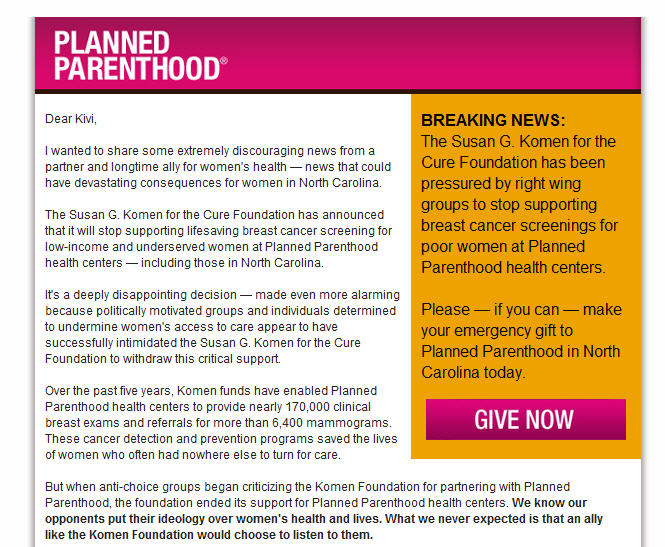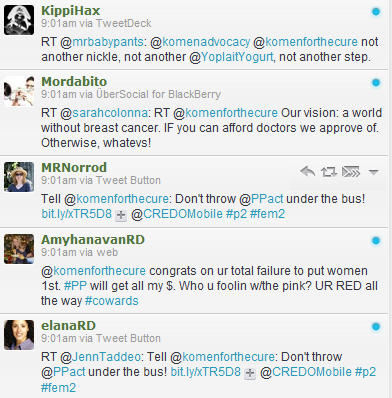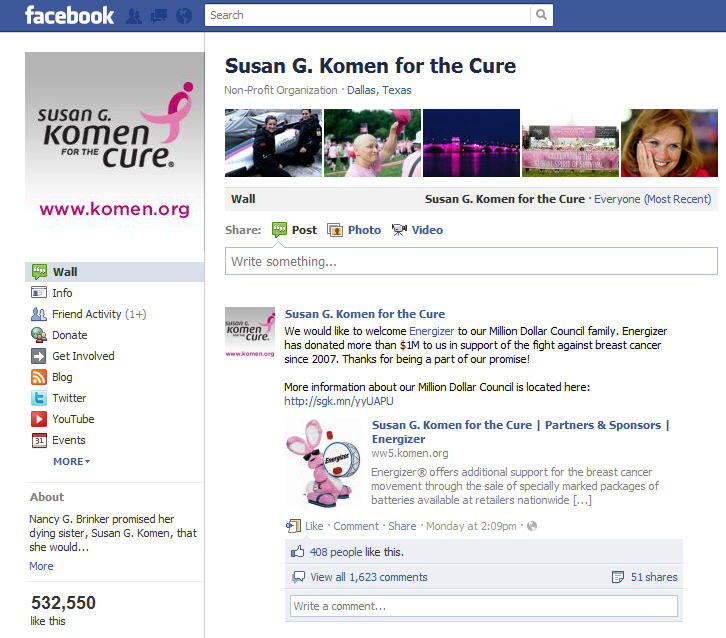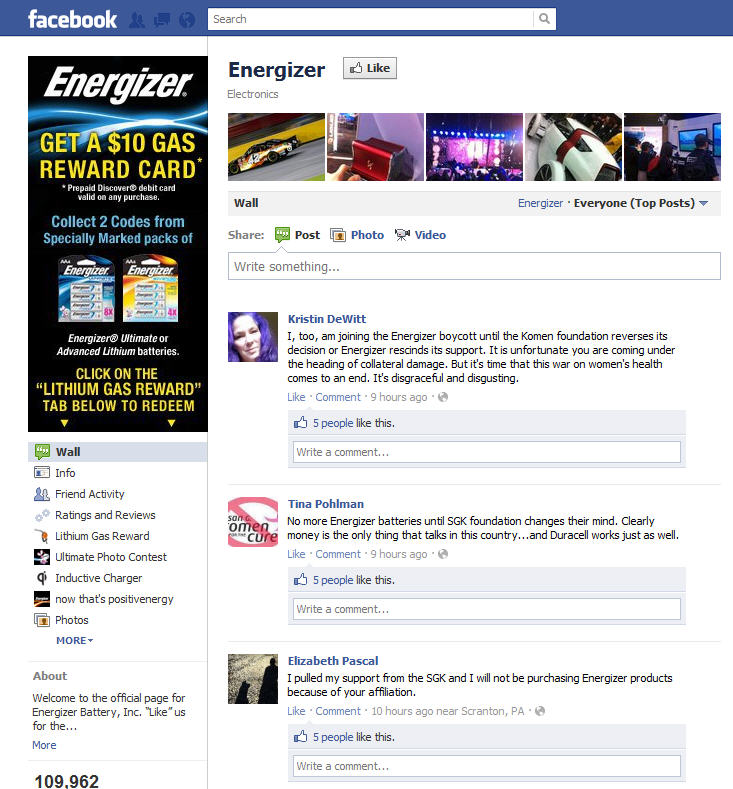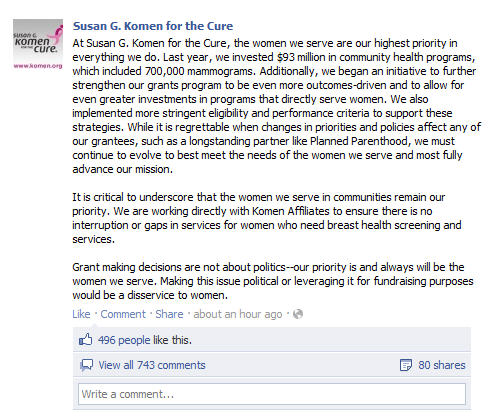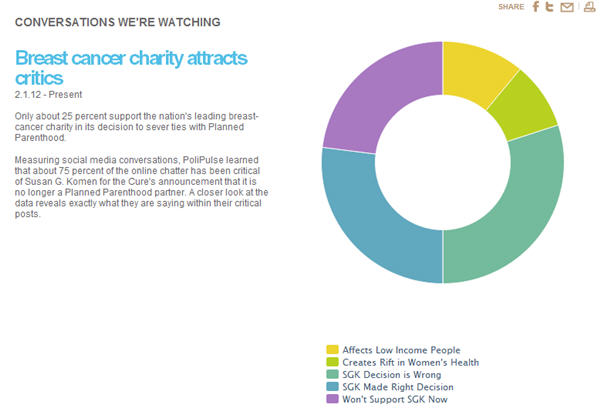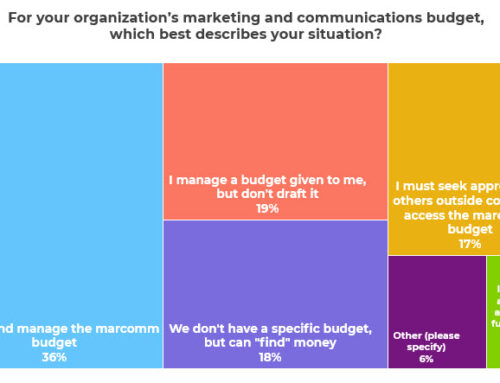Yesterday afternoon, and continuing into today, I believe we are witnessing the accidental rebranding of what is surely one of America’s biggest and most well-known, and even well-loved, nonprofit brands.
Komen for the Cure, it seems, is no longer a breast cancer charity, but a pro-life breast cancer charity.
Let me stop right here and say this post is not about abortion per se, one way or the other, other than the fact that it is the single most divisive issue in American politics today. My personal beliefs are very clear and public. But how you feel about abortion is really irrelevant to this communications debacle unfolding before us.
This post is about what happens when a leading nonprofit jumps into a highly controversial area of public debate without a communications strategy, stays silent, and therefore lets others take over the public dialogue, perhaps permanently redefining the organization and its brand. Watch and learn, so you don’t make the same mistake on whatever hot button issues your organization might be wading into.
Here’s what happened yesterday afternoon:
The AP reported that Komen for the Cure has decided to halt grants to Planned Parenthood that were used for breast cancer screening for low-income women. According to the reports, this decision was made in December and communicated to Planned Parenthood, which urged Komen to reconsider. Komen, citing a new policy that prevents grants to organizations under investigation, said because Rep. Cliff Stearns, R-FL, is investigating whether government money was improperly spent on abortions, the decision to pull the funding was final.
The AP story broke yesterday, and within hours, Planned Parenthood sent a fundraising email out to its network, asking supporters to replace the money that Komen had pulled for breast cancer screenings for low-income women.
Within minutes, both Facebook and Twitter were swamped with pro-Planned Parenthood, anti-Komen comments. At one point last night, I did a quick count and found the ratio of anti-Komen’s decision to pro-Komen’s decision to be about 80 to 1 on Twitter.
Some typical anti-Komen tweets:
Some typical pro-Komen tweets:
Adding another twist to the story, it seems that Karen Handel, Komen’s senior vice president for public policy, who was hired in April 2011, is a pro-life advocate who, when running for the Republican nomination for governor in Georgia, made her opposition to Planned Parenthood quite clear.
Now let’s look at Komen’s response . . . which is no response (until about 90 minutes ago). As one person on Twitter put it, just crickets.
Komen didn’t post on its Twitter or Facebook feeds last night, or first thing this morning. The only Komen action on their Facebook page had been to delete anti-Komen comments, so the ratio of negative to positive looks more like 10 – 1 instead of the 80 – 1 (and even higher this morning) on Twitter.
Komen’s most recent tweet was about prostate cancer in a mummy.
On Facebook, the most recent update was about a new sponsor, Energizer.
Take a quick look at the wall posts on Energizer’s page, and I suspect Komen has one unhappy sponsor right now (how unfortunate for Energizer to be the last update on the Komen page — it would have happened to any company in that position when the news broke):
Then around 10 am Eastern today, Komen finally updated its Facebook page. As of this moment (11:30 am ET), still no update on Twitter:
So What the Heck is Going on Here?
Let’s give Komen the benefit of the doubt and assume that they made this decision to stop funding Planned Parenthood very thoughtfully and deliberately. In that case, they would surely have realized that the likelihood of the story going public was high. They may not have counted on Planned Parenthood being so aggressive in turning the Komen decision into a fundraising campaign, but even without that, it’s still a big news story because of how high-profile Planned Parenthood funding of any kind is right now. And that’s all about abortion, which is about as divisive an issue as you can get in American politics right now.
The “Try to Rise Above It and Pretend This Decision Isn’t about the Most Divisive Social Issue in America” Strategy
Yet it appears that Komen wants to desperately pretend that this decision is being made in some completely different context. By not responding at all to the overwhelming negativity being thrown their way, and continuing to pretend that this has nothing to do with a red-hot social issue, they are alienating a big part of their constituency.
It seems like they are hoping this will just blow over. It won’t. This isn’t Komen’s first branding debacle: See the Kentucky Fried Chicken incident and suing smaller charities for using “for the cure” but I’d say it’s the biggest one yet.
What Should Komen Do Next?
Earlier this month, I urged nonprofits to decide how they are different, to embrace that, and forget the rest. Previously Komen stood out as a tremendous organizer and mobilizer of women across the political spectrum who would raise money like crazy for them. They kept it nice and simple, and non-controversial. Wear that pink ribbon and raise money to fight breast cancer. The abortion debate was nowhere in sight. It was all about the breasts, and not about the uterus. And I think that’s one thing that made them different — Komen was an organization that dealt with women’s health issues without getting caught up in the abortion debate, like most women’s organizations end up doing.
No more. They took a deep dive into the hot swirling waters head first (but apparently eyes shut). No matter what they do from here on out, they will be forced to pick sides, and that’s just awful for the Komen brand.
If they stick by their decision, they will endear themselves to pro-life women, and lose the pro-choice. If they give in to the pressure and petitions, they will win back the pro-choice women, but anger the pro-life. It’s a no-win situation that could have been avoided had they developed a communications strategy on this decision at the start. Sure, they would have still angered many of their supporters, but I believe they could have avoided this huge rift had they communicated upfront, and honestly, about the decision. They should have released it, instead of letting Planned Parenthood own the messaging.
The Branding Challenge, Part II
Now that they are full on into the abortion debate, Komen (I think) must now come out and say whether they think abortion causes breast cancer. If you look through the comment stream now, that particular question is what pro-life and pro-choice commenters are arguing with each other about. And as an organization with a mission to prevent breast cancer, I think it’s reasonable for supporters to expect Komen to make a statement about various theories on what causes it, including this one.
Let’s see how they handle that question, and whether they use it as a second chance to mend their brand, or if they fall deeper into the non-communicative abyss.
Can Komen Heal the Rift?
Regardless of how you feel about abortion, what do you think Komen could do to bring pro-choice and pro-life women back together to fight breast cancer hand in hand?
Or do you think this will all blow over with little long-term affect on Komen?
Share your ideas, and your thoughts on these communications questions in the comments.
UPDATE at 5:30 pm Eastern, 2/1/2012:
I’m quoted in this Politico story on the Komen mess. As the day went on, and Komen continued to say nothing, I got even more annoyed with how awful they are handling all this. They still haven’t tweeted anything (and that stupid mummy prostate tweet is what people see when they check their profile). So my criticism got a bit harsher . . . ~Kivi
UPDATE at 6:30 pm Eastern, 2/1/2012
Check out this analysis of the social media commentary by PoliPulse:
UPDATE at 9:00 am Eastern, 2/2/2012
Last night around 10 pm, after declining interviews with network news and major newspapers, Komen finally started tweeting and released this video response:
Contrast this response to what Planned Parenthood’s Cecile Richards did: interviews with all the major networks and this MSNBC interview:
Visit msnbc.com for breaking news, world news, and news about the economy
This morning, Beth Kanter published a post including a description of my process for creating this post (if you are interested in how content gets developed and the concept of newsjacking).
UPDATE at 5:30 pm Eastern, 2/2/2012
Nancy Brinker, founder of Komen, is interviewed by Andrea Mitchell. Do you think it helped or hurt?
Visit msnbc.com for breaking news, world news, and news about the economy
UPDATE at 8:00 am Eastern, 2/3/12
Komen board member speaks to the New York Times in Outcry Grows Fiercer After Funding Cut by Cancer Group. He says this really was specifically about Planned Parenthood and not overall “grant excellence” as Brinker has claimed. The article states, “John D. Raffaelli said Komen had become increasingly worried that an investigation of Planned Parenthood by Representative Cliff Stearns, Republican of Florida, would damage Komen’s credibility with donors.”
UPDATE at 1:23 pm Eastern, 2/3/12
Komen releases an apology and states they have amended their policy that the investigation must be “criminal and conclusive in nature and not political.”
Planned Parenthood’s response to the policy reversal.
Do you think this changes anything or is the damage done to the Komen brand irreversible?
UPDATE at 9:15 pm Eastern, 2/6/2012
THANK YOU everyone for such a lively conversation in the comments! But since the majority of new comments on this post are about religious arguments instead of nonprofit communications and management, I am closing comments. I will blog more about the Komen communications issues later this week and invite you to comment on that post.
ADDITIONAL UPDATES . . .
February 7: Ex-VP Karen Handel shares her side of the story, calling Planned Parenthood a “bully” — also see her first interview on Fox News. But interviews with Komen insiders tell a different story about what went down.
February 23: Komen hires PR firm to assess the damage and releases a survey on what they should say next. Another bad move in my opinion.
Here are some articles I’ve written and interviews I’ve given on recovering from a crisis . . .
Recovering From a Public-Relations Scandal: Tips for Komen (Chronicle of Philanthropy)
What Komen Should Do Next to Rebuild Trust (my blog)
Komen Fund’s Attempt to Reassure Donors Stumbles, Experts Say (Chronicle of Philanthropy)
Nonprofit Crisis Communications 101: Shorten the News Cycle (article on Nonprofit Marketing Guide)

